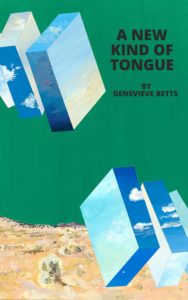 Review by Margaret Sáraco
Review by Margaret Sáraco
Genevieve Betts’ second poetry book, A New Kind of Tongue, follows her debut, An Unwalled City (Prolific Press). Betts, an assistant professor of English at Sante Fe Community College, also teaches creative writing for Arcadia University’s low residency MFA program in Glenside, PA.
The author takes us on a journey transitioning from living in Crown Heights, Brooklyn, to her new home in Sante Fe, New Mexico. It is no small task to move from New York to Arizona with her family, but this is only part of her story as she searches for understanding in a world that is constantly spinning. She is a teacher and student, mother and witness, poet and feminist. In “Tumbleweeds,” the poet moves the reader between the city streets and an unknown desert landscape, living in a cultural quandary.
a single lock of someone’s weave
rolling down the street like an urban
tumbleweed.
Now, in the desert,
there are actual tumbleweeds,
thorny balls of branches rolling,
it seems, always toward me. (24)
A New Kind of Tongue is body-experiential, visceral poetry, the kind that catches you in your gut, or rather on your tongue. The poet experiences nightmarish moments, awake or asleep, as she handles frightening timely topics and news of the day.
Betts braids themes of motherhood throughout her work and explores how to parent children when politics take hold of the narrative. In the wonderful “Working from Home,” she mentions Tender by Toi Dericotte, which includes themes of child abuse and the psychological effects.
I speed read poetry. My seven-
year-old opens Dericotte’s Tender
and asks, What’s a clitoris?
He renders me dictionary,
mother and anatomy teacher,
contextualizer of all adult things. (8)
Later in the poem, watching news about Trump with her son, he asks her to define porn star, collusion and impeachment. These words, synonymous with worry, exist and need to be explained. An underlying theme is how can we navigate our country’s dysfunction on many levels. Ultimately, this is a reminder of children moving from innocence. Betts can also be playful, evident in “Colors,” which is delightful to read aloud,
We would pray to Iris,
goddess of all colors,
made-up colors too—
the crayon they call
macaroni and cheese
and blurple, a mix
of purple and blue. (43)
Later, she follows with another motherhood/body poem, “Oh, the Places I’ve Pumped Breast Milk” where she catalogues and categorizes ending with the strange role of wet nurses in times past.
Structured into five sections, Betts explores different poetic forms including free verse, tercets, and couplets. In a refreshing twist, her centos use novels as her source material (unlike the common practice of using poems) including Louise Erdrich’s The Roundhouse, Haruki Murakami’s Kafka on the Shore, and Tom Robbins’ Even Cowgirls Get the Blues. “Until I Come Back,” cites thirteen different films the lines have come from including Being John Malkovich, Bad Education and Donny Darko. The seamless interlacing of these lines is pure artistry, as Betts conveys new meanings using her tongue.
In the fascinating, fun and frightening “Poem in Which I Address Two Chatbots,” the author explores the idea of speaking to robots, inspired by The Telegraph British newspaper’s transcripts of robot dialogue. She has questions. Betts ends the poem with “Are you, or are you not, a robot?” (33) Reminiscent of Descartes, “I think, therefore I am,” and Senator Eugene McCarthy’s demonist questioning, “Are you now, or have you ever been a Communist?” The human/robot dilemma is another body question.
She also writes about death in several poems. The first sentence of “Some Spell,” she dedicates to Tony Hoagland, will grab your heart, “In the fall there is so much beautiful/death” (29). He died of pancreatic cancer in 2018, at 64 years old.
But if “Some Spell” grabs your heart, the poem “Your Chair” about the death of one of her students by gunfire in an accidental shooting, will leave you aching. She follows it later in the collection with “Your Gun” where she personifies the gun, or rather the language of the gun:
Your gun speaks a different tongue,
flicks each word and phrase like
a corn snake licking the wind. (72)
Betts connects poems throughout her book with recurring themes and ideas, a reminder that we need to revisit what bothers us to better understand our shared humanity. Turn the page, read the next one, she will reveal more of her story and the reader will be better for it.
A New Kind of Tongue by Genevieve Betts
FlowerSong Press, 2023. $16, paper
9781953447494
Margaret R. Sáraco is the author of two poetry collections, If There Is No Wind and Even the Dog Was Quiet (Human Error Publishing.) She is a writer, spoken word artist, activist, workshop leader, and poetry editor for the Platform Review. Her work was nominated for a Pushcart Prize, and she has won several recognitions in the Allen Ginsberg Poetry Contest.
